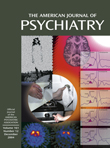Interferon for Hepatitis C Patients With Psychiatric Disorders
To the Editor: We read with interest the report by Dr. Onyike et al. involving a patient who developed mania while being treated with pegylated IFN-α and ribavirin. This is important since pegylated IFN-α is used in the treatment of chronic hepatitis C and other viral illnesses and has been associated with a significantly lower incidence of depression in comparison to unmodified IFN-α (1). While pegylated IFN-α may also be associated with a reduced incidence of mania, it is important for clinicians to be aware of this potential side effect. Neuropsychiatric disturbances usually occur after repeated IFN-α exposure (days or months) or upon treatment discontinuation. The latter may have been an important factor in the reported case since the patient missed many doses of IFN-α before starting the new course of pegylated IFN-α. Since preclinical studies have shown that IFN-α decreases dopamine in the brain (2), a sudden withdrawal from IFN-α may have induced a surge of this neurotransmitter, which has been hypothesized to be important in mania.
The authors minimized the likelihood that the selective serotonin reuptake inhibitor (SSRI) fluoxetine may have been implicated in the switching process since it was initiated years earlier and the dose was doubled over 4 months before this mood alteration. We take the opposite view, suggesting that fluoxetine may have contributed to the switching process. This opinion is partially based upon recent work by Ramasubbu (3), who described two depressed patients—one with unipolar depression and the other with dysthymia. In both instances, the patient became hypomanic when the SSRI (sertraline and paroxetine, respectively) dose was significantly increased, and the hypomania resolved with subsequent dose reduction. In these cases, the switching occurred approximately 1 month after the dose increase, similar to the case by Dr. Onyike et al., in which mania developed 4 months after the SSRI dose increase.
In addition to less serious side effects (e.g., gastrointestinal symptoms), antidepressants, including SSRIs, are capable of inducing hypomanic/manic episodes (4). This is a particular concern in patients with a history of bipolar disorder but has also been described in nonbipolar depressives (3), including the patient presented by Dr. Onyike et al. Patients with a previous history of IFN-α-induced depression may also prove to be especially vulnerable.
Gastroenterologists frequently treat patients with chronic hepatitis C with a history of bipolar or major depressive disorder. These physicians should consider consultation with a psychiatrist since many of these patients are already taking antidepressants and/or necessitate prescriptions of antidepressants to prevent and/or treat IFN-α-induced depression. A psychiatrist would more effectively be able to monitor and/or intervene if a hypomanic/manic episode occurred.
1. Fried MW, Shiffman ML, Reddy KR, Smith C, Marinos G, Goncales FL Jr, Haussinger D, Diago M, Carosi G, Dhumeaux D, Craxi A, Lin A, Hoffman J, Yu J: Peginterferon alfa-2a plus ribavirin for chronic hepatitis C virus infection. N Engl J Med 2002; 347:975–982Crossref, Medline, Google Scholar
2. Shuto H, Kataoka Y, Horikawa T, Fujihara N, Oishi R: Repeated interferon-alpha administration inhibits dopaminergic neural activity in the mouse brain. Brain Res 1997; 747:348–351Crossref, Medline, Google Scholar
3. Ramasubbu R: Dose-response relationship of selective serotonin reuptake inhibitors treatment-emergent hypomania in depressive disorders. Acta Psychiatr Scand 2001; 104:236–238Crossref, Medline, Google Scholar
4. Henry C, Sorbara F, Lacoste J, Gindre C, Leboyer M: Antidepressant-induced mania in bipolar patients: identification of risk factors. J Clin Psychiatry 2001; 62:249–255Crossref, Medline, Google Scholar



